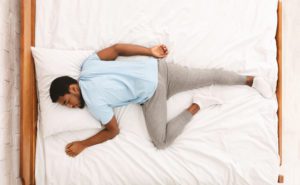
Encountering sleep disorders in early recovery is common. According to the National Center for Biotechnology Information, the likelihood of insomnia is five times greater in early recovery than in the rest of the general population. However, insomnia is not the only sleep disorder associated with addiction and recovery; circadian rhythm disorders, parasomnias, and sleep apnea could all present themselves, too. Poor sleep can lead to low mood, impulsivity, and a compromised emotional regulation, which can increase the risk for relapse.
As such, it is essential to improve the areas you can when it comes to sleep. Familiarizing yourself with good sleep hygiene is the first step to setting yourself up for better sleep. Additionally, you can tailor your sleep hygiene practices to suit your needs in order to create healthy habits and attain restful sleep throughout the night. Let’s further explore sleep hygiene in detail and how you can get the rest you need.
Why Is Sleep so Important?
Getting enough healthy sleep is essential for your physical and mental health. It improves your focus, energy, productivity, and overall quality of life. A big part of early recovery is being able to create a schedule and structure to help keep you motivated, consistent, and on track. Forming good sleep habits is essential not only for sleep but for helping you maintain the overall structure of your day. Some of the signs to be aware of that you’re not practicing good sleep hygiene are:
- Trouble falling asleep
- Hard time staying asleep
- Feeling tired and lethargic through the day
What Is Good Sleep Hygiene?
Getting good sleep is all about putting yourself in the best position to sleep well, which requires getting your mind and body into a state of relaxation. Optimizing your sleep schedule also requires a pre-bedtime routine, like avoiding the use of screens (TV, computer, phone) an hour before bed. Such routines function to develop the habits necessary for attaining good rest by helping your body and mind prepare for sleep.
Perhaps your quest for better sleep begins with creating a comfortable bedroom environment. You may think that a bed is all you need to sleep; however, the entire environment of the room can change the way your mind and body respond to sleep. For example, a tidy bedroom with a made bed is more relaxing than struggling with an unmade bed and having laundry or other clutter on the floor. In addition, decorating with calming or neutral colors and adding some plants or pictures can create a tranquil, if not meditative, environment that is more conducive to sleep.
Set Your Sleep Schedule
No matter what your schedule is, keeping a consistent sleep schedule helps sync your mind and body to normalize sleep as an essential part of your day. It also helps get your brain accustomed to getting the full amount of sleep you need. Strategies to help you achieve keeping a consistent sleep schedule include:
- Establish a consistent wake-up time, regardless of whether it is during the week or the weekend. Waking up at the same time helps you develop a good rhythm to maintain your schedule.
- Make sleep a priority. Like other areas of your schedule that prioritize work and home responsibilities, it’s essential to value and prioritize sleep the same way. Set boundaries at work and home by setting a target bedtime; this way, you will prevent yourself from working too much or late into the night.
- Make gradual changes. Begin changing your sleep schedule by working on winding down a half hour before bed. You might not hit your target the first night or first week, but slowly you will begin to fall asleep around or within your target time.
Cultivate Healthy Daily Habits
It is not just bedtime habits that contribute to good sleep; the habits you practice during the day help you rest better. For example, at night, your body requires sleep and darkness to help it produce serotonin, a hormone that helps regulate your sleep and wake cycles. Serotonin also helps stabilize feelings of well-being and happiness and can alleviate feelings of depression, and help regulate anxiety.
During the day, it is essential to get a good dose of daylight so your brain can produce dopamine. Dopamine is a type of neurotransmitter that helps with focus, motivation, circadian rhythm, and sleep. When you take the time to get some daylight, whether it is going outside, sitting by a window, or exercising outdoors, you are helping your body balance the hormones necessary for daily activities and sleep. Furthermore, make it a daily habit not to drink too much caffeine, eat late or watch TV or your phone in bed because these all can interfere with your sleep quality.
Improving sleep is essential in helping balance out your emotions in early recovery. However, cultivating a sleep routine can be challenging, and you might find it challenging to resolve sleeping problems even after keeping a schedule. If you are continuing to struggle with getting good rest, the time to reach out for help is now. At Choice House, we provide a safe, comfortable, and peaceful environment for men to come together and develop skills needed for recovery, including working on good sleep hygiene. Our treatment facilities and residential treatment adhere to keeping rules and boundaries, including set bedtimes. In addition to the therapies and activities we practice every day, you will begin to develop the habits necessary to maintain a good recovery regimen long after treatment. We also provide 24/7 admissions, so there is always the opportunity for help. Find out more by calling Choice House at (720) 577-4422.
